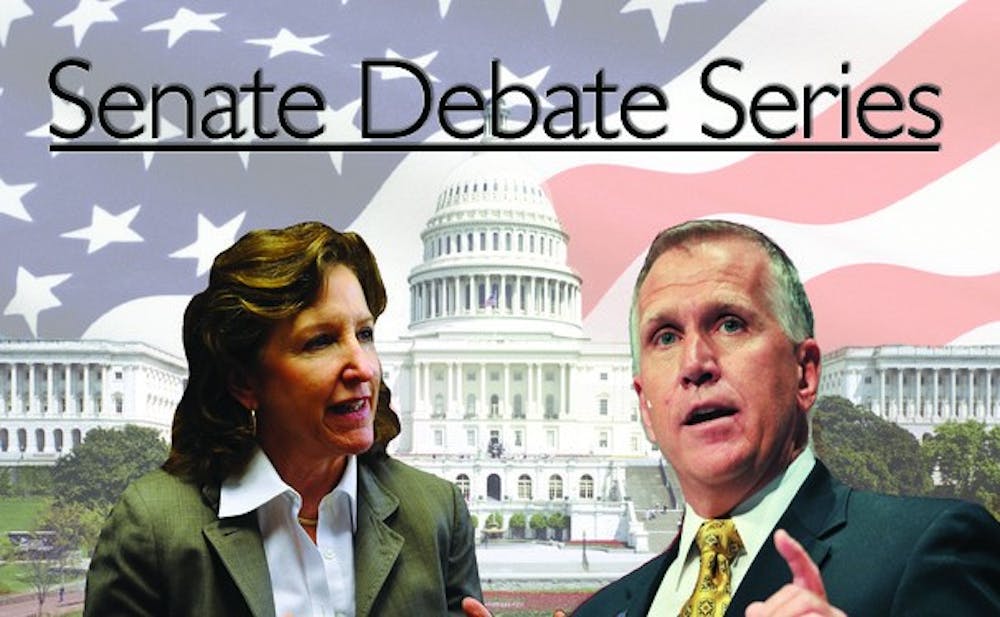Democratic senator Kay Hagan and House Speaker Thom Tillis came out with guns blazing Tuesday in their second of three U.S. Senate debates.
With the race still tight less than a month before election day, the candidates criticized each other more directly than was the case in September's debate. The North Carolina seat has been the target of both Democrats and Republicans hoping to tip the tentative Senate majority in their favor, and the two candidates have been locked in a dead heat in what is the most expensive Senate race in the nation, according to the nonpartisan Center for Responsive Politics. Held at the UNC-TV studios in Research Triangle Park and moderated by ABC News anchor George Stephanopoulos, the debate highlighted foreign policy, education and healthcare, among other issues.
Hagan argued that "Tillis built a record of dividing our state," emphasizing that North Carolina "is a state where the weak grow strong and the strong grow great."
On the other hand, Tillis noted that "Senator Hagan went to Washington...promised us she’d be different and...broke her promise."
Education was among the hotly contested topics discussed at the debate. While Hagan challenged Tillis’ opposition to a bill that would have allowed students to refinance their student loans, Tillis pressed the importance of creating more jobs for recent graduates to pay off their debts rather than “let the government do it for [them]”.
The state of public education in North Carolina—which has recently come under fire for low teacher pay and falling standards—was also discussed at length. Tillis noted his role in introducing a teacher pay increase of 7 percent on average, while Hagan expressed skepticism of that claim. She further accused Tillis of cutting $500 million from North Carolina's public education system.
“We are 48th in the nation in per-pupil spending,” Hagan said, noting the incidence of fewer teachers, larger classroom sizes and outdated textbooks.
Healthcare was another hotly discussed issue, with Tillis speaking out against Hagan’s support of the Affordable Care Act. He claimed that Hagan broke a promise—that any person who liked their healthcare plan could keep it—24 different times, noting that more than 50,000 North Carolina residents have received cancellation notices over the past few weeks.
“Adding a trillion dollars to the debt doesn't make sense. Robbing Medicare of 700 million [dollars] doesn’t make sense,” Tillis said.
Hagan defended her support of the Affordable Care Act, claiming that seniors and women would have had to pay more for prescription drugs and medical coverage had the act not been implemented.
"Speaker Tillis would repeal this law and take us back to a broken system," she said.
Hagan also claimed that Tillis' role in rejecting statewide Medicaid expansion led to the loss of healthcare for 500,000 North Carolinians.
She called into question another aspect of Tillis' legislative record, in particular his stance on raising the minimum wage and his vote to block a paycheck fairness act. According to the American Association of University Women, women in North Carolina earned 82 percent of the median income of their male counterparts in 2012, she noted.
Tillis defended his record by maintaining that a focus on the economy was preferable to “just more rubber stamps."
In turn, Tillis accused Hagan of failing to fulfill her responsibilities on the Senate's Foreign Relations Committee.
While Hagan clarified that she serves on the Armed Services Committee and not the Foreign Relations Committee, the Tampa Bay Times' fact-checking resource PolitiFact confirmed that Hagan had attended 9 out of the committee’s 22 open meetings within the last year—placing her 21st out of 26 members on the committee.
Both contenders were open to the possibility of a travel ban to alleviate concerns about Ebola. While Hagan noted that isolation would not completely solve the problem, Tillis advocated for a more proactive approach, including enhancing border security. He challenged Hagan to “step up and address these problems.”
When asked which of their own party's stance each candidate disagreed with, Tillis found it “hard to say” and instead discussed the bipartisan problem in the Senate. In response to the same question, Hagan advocated for building the keystone pipeline and limiting deep budget cuts to the military.
A third debate will be held with Libertarian candidate Sean Haugh in Wilmington on Thursday.
Get The Chronicle straight to your inbox
Signup for our weekly newsletter. Cancel at any time.

